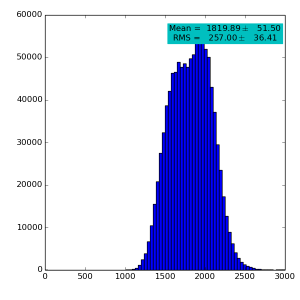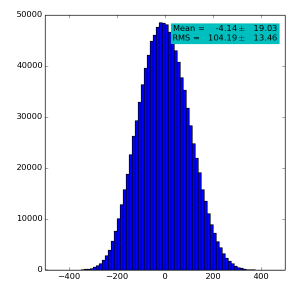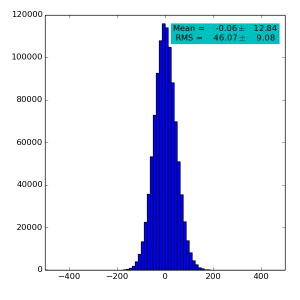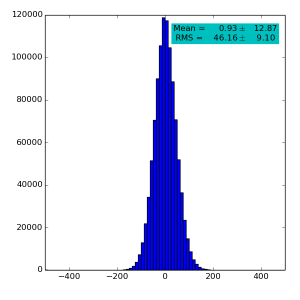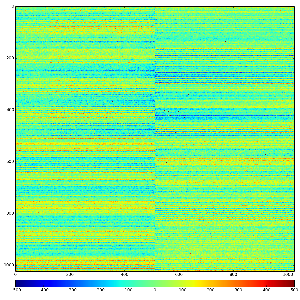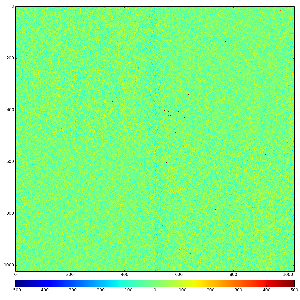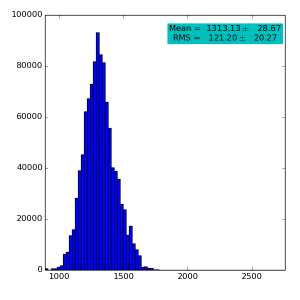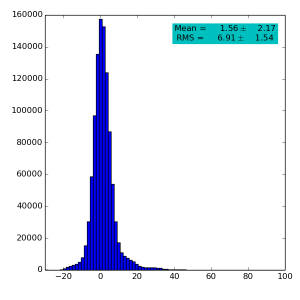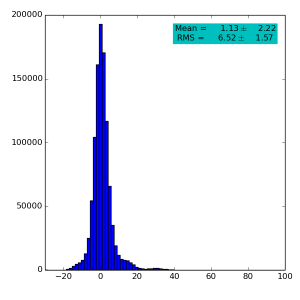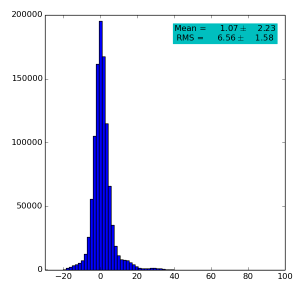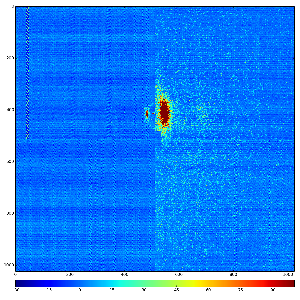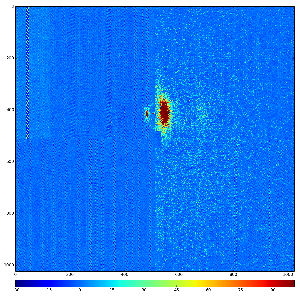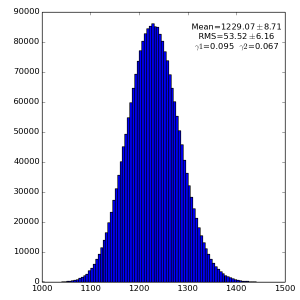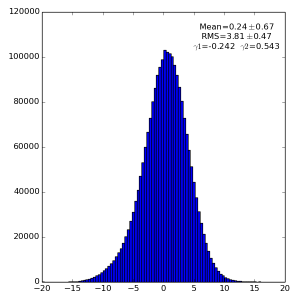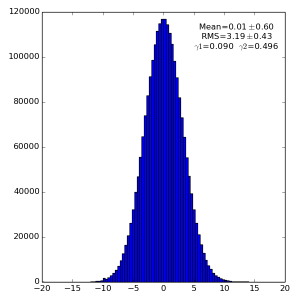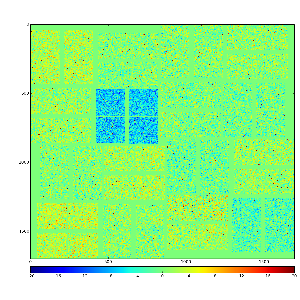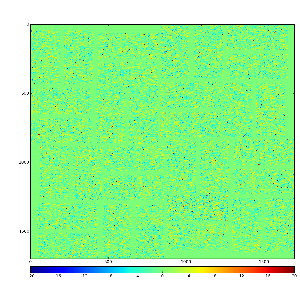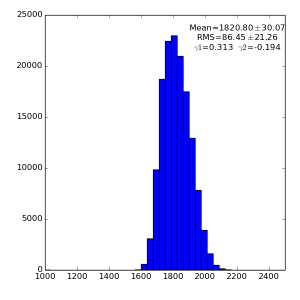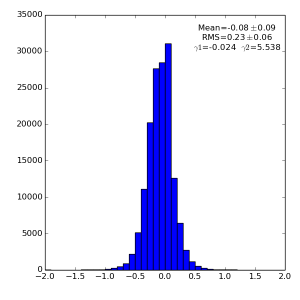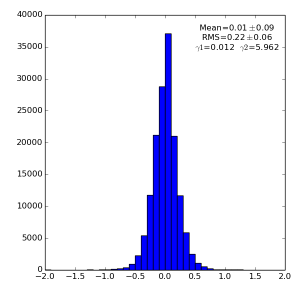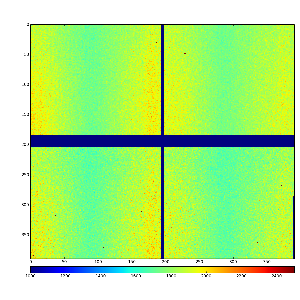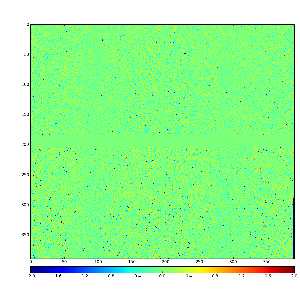Content
Common mode correction
Most of pixel array detectors produce imaging data that can not directly be used in analysis and need in corrections. Most popular corrections are
- dark rate (pedestal) subtraction,
- bad pixel masking,
- common mode correction,
- gain correction,
- etc.
In this note we discuss common mode correction algorithms. Common mode is a hardware effect of collective pixel intensity variation due to synchronous variation of potentials on sensor chip or ADC at readout process. This effect can be corrected at low sensor illumination, where the number of pixels with energy deposition from photons is small. The spectrum of pixel intensities without photons should be grouped in the peak with small offset of the average from zero (if the dark rate correction is already applied) due to the common mode effect. This offset can be evaluated and subtracted from all pixel intensities in the group of synchronously fluctuating pixels. This correction is detector-dependent, because detectors may have many ADCs working on different groups of pixels. Algorithms are also detector-dependent in order to better account for sensor behaviour.
Implementation
Below we describe common mode correction algorithms implemented in psana module ImgAlgos::NDArrCalib. This correction along with others can be applied to raw ndarray under control of the psana configuration file for specified detector, for example for Epix100a:
[ImgAlgos.NDArrCalib] source = DetInfo(:Epix100a) key_in = ndarray-raw key_out = ndarray-clb do_peds = yes do_cmod = yes do_stat = yes ...
where keywords do_peds and do_cmod should have value yes or true in order to turn on pedestal subtraction and common mode correction algorithms. Each algorithm may load file with parameters from calibration directory, which by default accounts for experimnet, calibration version, data source, calibration type and run range:
/reg/d/psdm/<INS>/<experiment>/calib/<calib-version>/<data-source>/<calibration-type>/<run-range>.data For example: /reg/d/psdm/XPP/xppi0614/calib/Epix100a::CalibV1/NoDetector.0:Epix100a.0/pedestals/0-end.data /reg/d/psdm/XPP/xppi0614/calib/Epix100a::CalibV1/NoDetector.0:Epix100a.0/common_mode/0-end.data
Content of this file depends on calibration type and algorithm, as shown below.
Algorithms
In module ImgAlgos::NDArrCalib we use algorithms earlier developed for CSPAD and other detectors and currently residing in ImgAlgos and psalg packages.
Selection of algorithm of particular type is controlled by the parameters in file for common_mode calibration type.
#1 - common mode peak finding algorithm
common_mode parameters for CSPAD and CSPAD2x2
1 50 50 100
- par[0] - algorithm #
- par[1] - maximal deviation of the peak mean from 0
- par[2] - maximal allowed value of the peak RMS
- par[3] -threshold on number of pixels in the ADU bin in the peak finding algorithm
for other detectors
- par[4] - number of segments for common mode evaluation
- par[5] - segment size (number of pixels for common mode evaluation)
par[6] - stride (step for jump to the next pixel)
For example:
1 50 50 100 8192 128 1
#2 - MEAN evaluation
- par[0] - algorithm #
- par[1] - maximal threshold on intensity to evaluate mean for low intensities
- par[2] - maximal allowed common mode correction
par[3] - length of consecutive pixel array for common mode evaluation
For example, for pnCCD one can evaluate common-mode for one came chip (128 channels):1 1000 1000 128
- The algorithm loops over the data and evaluates consecutive arrays of specified length (which might represent for example a row of pixels in a readout chip) and finds the mean value for values below a threshold, ignoring masked pixels. It corrects all the data if the calculated common mode is less than the maximal allowed correction. The median algorithm is more stable in many cases and is recommended.
#3 - MEDIAN evaluation
Parameters are the same as in #2. The algorithm is as above, except that it calculates the median, or the average of the two median points if there are an even number passing the selection criteria.
Test of the common mode correction for pnCCD
To test implementation of algorithms in ImgAlgos::NDArrCalib we use the same data sets as in 2014-03-25-Ankush-CommonModeNoise.pdf
Use data from experiment amob5114
High gain pnCCD run 121
2(or 3) 1000 1000 128
Spectra for 1) raw data, 2) subtracted pedestals, 3) subtracted common mode correction algorithm #2 and 4) algorithm #3:
Images 1) for subtracted pedestals and 2) common mode correction algorithm #2:
High gain pnCCD run 329
2(or 3) 1000 1000 128
Spectra for 1) raw data, 2) subtracted pedestals, 3) subtracted common mode correction algorithm #2 and 4) algorithm #3:
Images 1) for subtracted pedestals and 2) common mode correction algorithm #2:
Summary for pnCCD
Common mode correction for pnCCD
- gives significant effect in low gain mode and is negligible in high gain mode
- algorithm #2 gives the best results, #3 a little bit worse, #1 - does not work for pnCCD
Test of common mode correction for CSPAD
Use cxi83714-r0136 with
1 10 10 100
Spectra for 1) raw data, 2) subtracted pedestals, 3) subtracted common mode correction algorithm #1:
Images 1) for subtracted pedestals and 2) common mode correction algorithm #1:
Summary for CSPAD
Common mode correction for CSPAD works with algorith #1 and shows significant effect.
Test of common mode correction for CSPAD2x2
Use meca1113-r0045 with
1 50 10 (100) - last parameter is set by default
Spectra for 1) raw data, 2) subtracted pedestals, 3) subtracted common mode correction algorithm #1:
Images 1) raw data and 2) subtracted pedestals with common mode correction algorithm #1:
Summary for CSPAD2x2
Common mode correction for CSPAD2x2 in this example shows minor improvement.
References
2014-03-25-Ankush-CommonModeNoise.pdf - stand-alone test of common mode correction for pnCCD
psana - Module Catalog - Module ImgAlgos::NDArrCalib
